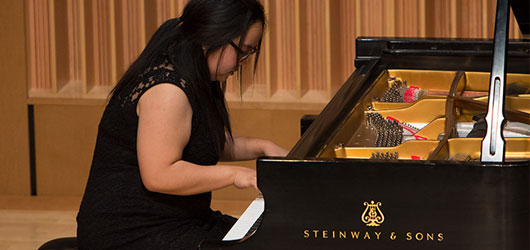 Pictured | Joohee Jeong | Masters in Music Performance | B.M., Piano, IU South Bend, 2016 | Suwon, South Korea (hometown)
Pictured | Joohee Jeong | Masters in Music Performance | B.M., Piano, IU South Bend, 2016 | Suwon, South Korea (hometown)
Photo provided by the Ernestine M. Raclin School of the Arts
Music Degree Programs
Graduate students with a bachelor’s degree in music from an accredited college or university or its demonstrated equivalent may undertake:
Admission
All preliminary inquiries about graduate study in music at IU South Bend are to be referred to the graduate admissions and retention office. Applications for admission to the Master of Music degree program are available online at https://www.iusb.edu/graduate-studies/index.php or from the Ernestine M. Raclin School of the Arts. Applicants must also submit official transcripts from all previous colleges and universities as well as the application fee. More information about entrance requirements and admission procedures for the Master of Music degree is available online.
Placement Examinations
After successfully completing an audition in the chosen performance area, and before beginning coursework on the Master of Music degree, each student will take graduate placement examinations in music history, theory, aural skills, keyboard skills, and diction (voice students only). If deficiencies are revealed, students will be required to complete one or more of the graduate-level review course(s) listed below before beginning the graduate curriculum. Credits earned for review courses do not count towards the degree. Prospective students may contact the director of graduate studies for general information about the format and content of these examinations.
Theory
This examination is based on the assumption that the candidate has had at least two years of undergraduate theory study. The examination includes topics in writing and analyzing of music from sixteenth century and eighteenth century counterpoint, diatonic and chromatic harmony, and twentieth century analysis techniques.
Students who fail any portion of the exam must enroll in the appropriate review course.
Music History
This examination comprises two parts. The first section covers music from the Ancient Greeks through the Baroque Period (up to 1750); the second covers music between the Classical period and WWII (1750-1945). Each portion focuses on the major composers, genres, musical developments, and ideologies that affected the development of music. The exam includes listening identification, short answer questions, and essays.
Note | Students who fail all or part of this examination must enroll in MUS-M 505 Graduate Music History Review I and/or MUS-M 506 Graduate Music History Review II.
Graduate remedial courses in history, literature, and theory may be taken only twice. Failure in any of these remedial courses for the second time results in the student’s dismissal.
Keyboard and Aural Skills
The placement exam for keyboard skills is designed to determine if any remedial work is needed before taking the Keyboard Proficiency Exam, which is offered at the end of each semester. The placement exam will be offered the week before classes start. The skills required are:
- Play any major scale: hands together, two octaves
- Play a given Roman numeral chord progression with two hands (in a major key to four sharps or flats)
- Play a melody with accompaniment with indicated Roman numerals
- Sight-read a four-part chorale or hymn
The aural skills placement covers singing diatonic, chromatic, and atonal melodies, taking a dictation for two voices with Roman numeral and chord-quality recognition, and aural analysis.
Keyboard Proficiency
The Keyboard Proficiency Examination is given at the end of each semester. Students who fail the examination must register in Piano until the requirement is met.
Designed to ensure the student's ability to use the piano as a tool within the framework of professional activities, the requirements vary according to level and area of music study. Students are to discuss specific requirements with their music advisors.
Other Examinations
Other examinations pertaining to specific degrees may be required as appropriate.
Photo credit | Photo provided by the Ernestine M. Raclin School of the Arts